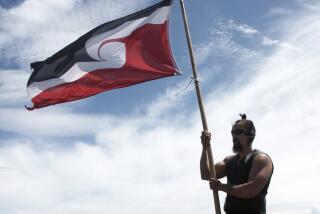A ‘Messiah’ is born? Not in New Zealand
- Share via
You may think your kid is a princess, but in New Zealand, you can’t name her that.
Not officially, anyway. “Princess” is on a lengthy list of names banned in the last six months by the New Zealand government, which requires parents to register the names of their newborns.
Under the rules, you cannot give your offspring a name that is excessively lengthy, offensive or includes an official title “without adequate justification,” the Australian Associated Press reports. In one case that made headlines five years ago, a New Zealand judge reportedly made a 9-year-old girl a ward of the court so she could shed the name “Talula Does the Hula From Hawaii.”
Since 2001, New Zealand has turned down six toddling “Lucifers,” two “Messiahs” and a “Saint,” according to an updated list obtained by CNN. “Justice” was turned down a whopping 62 times, not including rejected twists such as “Justus” and “Juztice.”
Names packed with punctuation, such as brackets or backslashes, were nixed, as were names made of a single letter such as T or E, and the impressively reductive “2nd” and “3rd,” according to the CNN list. Perhaps the luckiest to be born a Kiwi was a would-be “Anal.”
Yet other unusual names have passed muster in New Zealand, including “Midnight Chardonnay” and “Number 16 Bus Shelter,” according to the BBC.
New Zealand isn’t the only country to regulate baby names. An Icelandic teenager won a lawsuit this year to use the name Blaer, which officials had rejected as insufficiently feminine for a girl. Swedish families went to court years earlier to name their kids Metallica and Elvis.
In 1996, one Swedish family protested the law by registering their 5-year-old son as Brfxxccxxmnpcccclllmmnprxvclmnckssqlbb11116. The 43-letter name, rejected by Swedish authorities, was pronounced “Albin,” they said.
The Dominican Republic weighed whether to start barring names four years ago, when an electoral commission judge complained about names such as Toshiba and Querida Pina -- Dear Pineapple -- according to the Associated Press. Venezuela toyed with the idea before deciding against it.
Clamping down on unusual names such as or Iroshima or Nixon could trample “the right to liberty,” Venezuelan Electoral Council member Sandra Oblitas told the Associated Press.
Colorful as many of the banned names are, the most common monikers in New Zealand are much less attention-grabbing: Olivia, Sophie and Emily topped the list for girls last year, while Jack, Oliver and William were most popular for boys, the Department of Internal Affairs reported in January.
ALSO:
WWII poster calls for calm; now it stokes frenzy, feud
Mexican columnists ponder Obama visit, wisdom of drug war
British man gets 10 years in jail for selling fake bomb detectors
More to Read
Sign up for Essential California
The most important California stories and recommendations in your inbox every morning.
You may occasionally receive promotional content from the Los Angeles Times.













